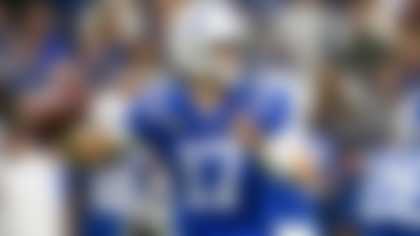Franchise quarterback is the most elusive and essential need in all of pro football. NFL teams are desperate to find one, willing to part with valuable draft capital or invest millions in the hopes of adding this critical piece to the roster. But too often in their pursuit of a top-tier passer, organizations mistake adequate for exceptional, fooling themselves into thinking a middle-of-the-road passer is worthy of being the face of the franchise.
So what is a franchise quarterback, and which teams have had the best run of them? To answer these two questions, we established four simple criteria and applied them to every quarterback since the common-era draft began in 1967, when the AFL and NFL first began drafting together. To qualify, a player must have 48 starts with one team and meet two of the following three requirements:
1) Winning regular-season record.
2) Minimum passer rating of 75.0.
3) At least one Pro Bowl selection.
None of these provisions alone paint a perfect picture, but together they help to illustrate sustained production at an above-average level. And at the core of what all fans crave from their quarterback is someone who consistently keeps the team competitive and provides a realistic shot at the playoffs. Everything else is gravy.
For every franchise passer teams get right, there are countless others they miss on entirely. That's why we've also identified each organization's biggest QB misstep. Perspective is important, and we should always remember just how bad things can get when dependable quarterback play disappears.
Because we only considered a player's performance from 1967 onward, some notable passers, such as Bart Starr and Don Meredith, aren't included, while others, like Johnny Unitas, only have post-'66 production factored into their franchise QB eligibility.
I'm sure you'll agree with all of the choices below, so I don't expect any disparaging tweets. Next up: NFC West.
NOTE: Pro Bowl totals below include AFL All-Star Game selections, while Super Bowl ring totals only include titles won as the team's starting quarterback. The names of franchise QBs who are also their team's current starter are bolded.
Arizona Cardinals
THE Franchise QB: Jim Hart
Warner came dangerously close to being the all-time franchise QB for two teams. Palmer also has a decent case for holding this honor. But I opted to go for a guy who actually doesn't even qualify, according to my criteria. Hart, who made 180 starts for the Cardinals from 1967 to 1983, does not meet either the W/L (he went 87-88-5) or passer rating (his was 66.6) thresholds. However, he's the only NFL quarterback who made four or more Pro Bowls with the same team in the Super Bowl era and didn't otherwise make it to his team's list of franchise guys. Plus, the team's all-time passing leader graduated from the same high school as me (Niles West, in Skokie, Illinois), so I made an exception. Hart spent 18 seasons(!) with the franchise, enjoying his best years under passing scheme guru Don Coryell from 1973 to '77. When the outspoken coach left for the Chargers after an extremely public fallout with ownership (more on that below), Hart's play dropped off a cliff. It's fair to argue over how much of his success stemmed from the system that became known as "Air Coryell" in San Diego, but I'm not going to get sidetracked with "what ifs" here (again, saving those for the next section). Hart and Warner are the only two Cardinals QBs of the Super Bowl era who are in the team's Ring of Honor.
Biggest QB misstep: Don Coryell's departure
Coryell revolutionized the passing game, helping to create the aerial attacks we know today. His influence on quarterbacks cannot be overstated, and his winning tradition (three straight 10-win seasons) wouldn't be duplicated by the Cards for 40 years. And yet, after just five seasons at the helm -- and two division titles -- Coryell left due to disagreements with ownership on personnel matters, among other things. In 1978, he took over the San Diego Chargers' top job, where he transformed their QB1, Dan Fouts, into a six-time Pro Bowler and Hall of Famer, while leading the organization to four straight playoff appearances. Jim Hart would later tell the St. Louis Post-Dispatch that the legendary coach felt the Cardinals could've had even "more success" than the Chargers if issues had been resolved differently in St. Louis. So while the Matt Leinart, Steve Pisarkiewicz and Timm Rosenbach picks all worked out terribly for the Cardinals organization, the franchise's biggest mistake was letting the master of modern passing walk out of the building (and then changing the locks behind him).
Longest QB drought: 1989-2004
The Cardinals have a new offensive guru at head coach (Kliff Kingsbury) and his hand-picked signal-caller (Kyler Murray) set to start, so optimism is high in the desert. But it wasn't too long ago that the franchise experienced a rough patch at the position. Jay Schroeder, Kent Graham and Dave Brown, as well as aging veterans like Dave Krieg and Boomer Esiason, combined to win 88 of 256 games. That's a .343 win percentage. Honorable mention to the post-Warner, pre-Palmer era, which included starts from (recently retired) Derek Anderson, Max Hall, Brian Hoyer, Kevin Kolb, John Skelton and Ryan Lindley.
Los Angeles Rams
Who qualifies for the Rams?
-- Marc Bulger (2002-09): 95 starts | 41-54 | 2 Pro Bowls | 84.4 passer rating
-- Kurt Warner (1998-2003): 50 starts | 35-15 | 3 Pro Bowls | 97.2 passer rating | 2 MVPs | 1 SB ring
-- Jim Everett (1986-1993): 105 starts | 46-59 | 1 Pro Bowl | 78.1 passer rating
-- Pat Haden (1976-1981): 55 starts | 35-19-1 | 1 Pro Bowl | 69.6 passer rating
-- Roman Gabriel (1967-1972): 82 starts | 55-22-5 | 3 Pro Bowls | 75.9 passer rating | 1 MVP
THE Franchise QB: Kurt Warner
Warner made just 50 starts for the Rams, but boy, was he efficient, piling up two MVPs, two first-team All-Pros, three Pro Bowls and the franchise's first and only Super Bowl title in that span. Sam Bradford started 49 games for the organization and achieved none of those accomplishments. Warner certainly benefited from playing in an offense with two Hall of Famers (Orlando Pace, Marshall Faulk) and two game-changing receivers (Torry Holt, Isaac Bruce). But No. 13 was the conductor of the "Show", and under his direction, the Rams produced two of the best offensive seasons of all time.
Biggest QB misstep: Moving on from Warner
There was a lot of internal discussion among my colleagues about whether Sam Bradford should be the choice here. After signing the biggest rookie contract in NFL history in 2010 (six years, $78 million), expectations couldn't have been higher for the Oklahoma QB. And though he did win Offensive Rookie of the Year, there were so few wins the rest of the way. The former No. 1 overall pick totaled just 18 Ws for the franchise over five NFL seasons (he was traded to the Eagles in the final year of his rookie deal), which comes out to just over $3.6 million per victory.
But while the Bradford mistake might have set the franchise back for a short period of time, the Warner decision perhaps cost them a second championship. Two years after winning the MVP and leading the Rams to a Super Bowl, Warner was benched outright by head coach Mike Martz after the QB fumbled six times in Week 1. I recognize that's not good. I also recognize that his replacement, Marc Bulger, went on to win 12 games that season and a division title. That early success is part of the reason his name is listed above. But not all franchise QBs are created equal. The 12-4 mark was the best the franchise managed under Bulger, who played six more seasons for the Rams, going 23-50 from 2004 to '09. Warner, meanwhile, resurrected his NFL career in Arizona, where he won the Walter Payton Man of the Year award, advanced to another Super Bowl and earned his fourth Pro Bowl nod. Oh, and he was enshrined in the Pro Football Hall of Fame in 2017. The Rams' 1-15 record in 2009, Bulger's final pro season, netted them the 2010 first overall pick. ... And we've come full circle.
Longest QB drought: 2007-present
As stated above, Bulger and the Rams were straight bad during his final seasons, which is why I'm starting this drought before his tenure with the team actually ended. The QBs that followed him -- and there were many, because of Bradford's numerous injuries -- would make a Browns fan smile: Kyle Boller, A.J. Feeley, Kellen Clemens, Austin Davis and Shaun Hill. But the future looks bright at the position for the Rams. After a forgettable rookie season, Jared Goff has developed into a top-10 quarterback and will need some terrible luck next season not to qualify as one of the Rams' franchise QBs.
San Francisco 49ers
Who qualifies for the 49ers?
-- Alex Smith (2005-2012): 75 starts | 38-36-1 | 0 Pro Bowls | 79.1 passer rating
-- Jeff Garcia (1999-2003): 71 starts | 35-36 | 3 Pro Bowls | 88.3 passer rating
-- Steve Young (1987-1999): 124 starts | 91-33 | 7 Pro Bowls | 101.4 passer rating | 2 MVPs | 1 SB ring
-- Joe Montana (1979-1992): 139 starts | 100-39 | 7 Pro Bowls | 93.5 passer rating | 2 MVPs | 4 SB rings
-- John Brodie (1967-1973): 73 starts | 37-32-4 | 1 Pro Bowl | 72.4 passer rating | 1 MVP
THE Franchise QB: Joe Montana
Steve Young is an all-time great who would without a doubt be numerous teams' all-time franchise QB. But rings speak louder than words, and Montana's got a bunch of 'em. Although Tom Brady has succeeded Montana as the GOAT, the 49ers legend remains one of the greatest professional football players ever. He dominated the '80s from under center, posting the highest passer rating (93.8), completion percentage (63.6), winning percentage (.748) and passing yards (33,107) from 1981 (when he became the team's full-time starter) to 1990. The 49ers won 11 more games and scored nearly 200 more points during that span than the next closest team. As good as Young was, he'll forever live in the shadows of Montana's likeness on the QB Mt. Rushmore.
Biggest QB misstep: Failing Alex Smith
Alex Smith got a raw deal in San Francisco. That's right, I said it. As the first overall pick in the 2005 NFL Draft, Smith was charged with providing consistency and stability under center for a franchise that regularly changed everything else around him. He had five different offensive coordinators in his first five seasons, with an ever-rotating cast of pass catchers. It's impossible to build relationships with your teammates and establish timing on plays when both differ drastically from one year to the next. Smith finally received some continuity under Jim Harbaugh in 2011, and what did he do? He went 19-5-1 over two seasons, including 13-3 with a playoff win in 2011. Smith isn't totally absolved of his poor performances early in his career, and he did suffer numerous injuries during his Niners tenure, including the one that opened the door for Colin Kaepernick to claim the QB1 job. But the franchise QB's final seasons in San Francisco -- along with what he went on to do in Kansas City -- strongly suggest the organization let Smith down, not the other way around.
Longest QB drought: 2013-present
The Harbaugh-49ers divorce after the 2014 season left many 49ers fans despondent, but no one was hurt more by the separation than Colin Kaepernick. Under Jim Tomsula and Chip Kelly, the polarizing QB's play plummeted from the heights of the Harbaugh era, no matter what the stats suggest. That said, there's enough film on the passer to prove that his dynamic, game-changing ability wasn't a fluke. With different coaching and a commitment to his skill set, Kap's name would be listed above -- in fact, he would have qualified, had he won just two more games. San Francisco paid current starter Jimmy Garoppolo like a top-10 player at the position, but with just eight starts under his belt, it's too soon to pass judgment on his 49ers legacy.
Seattle Seahawks
Who qualifies for the Seahawks?
-- Russell Wilson (2012-present): 112 starts | 75-36-1 | 5 Pro Bowls | 100.3 passer rating | 1 SB ring
-- Matt Hasselbeck (2001-10): 131 starts | 69-62 | 3 Pro Bowls | 82.2 passer rating
-- Dave Krieg (1980-1991): 119 starts | 70-49 | 3 Pro Bowls | 82.3 passer rating
THE Franchise QB: Russell Wilson
Russell Wilson has been one of the NFL's best quarterbacks since he entered the league in 2012. His recent mega contract says as much. The former third-rounder doesn't throw the most passes or for the most yards, but he is incredibly efficient and remarkably clutch. Since being drafted, Wilson ranks fourth in touchdown percentage (6%) and third in yards per attempt (7.86) while ranking second in both fourth-quarter comebacks (17) and game-winning drives (23) among QBs with at least 20 starts. Oh, and he wins. A lot. Only Tom Brady (83) has more total Ws than DangeRuss (75) in the past seven seasons. The 12s have to be overjoyed the Wilson-to-the-Giants rumorsstayed rumors.
Biggest QB misstep: Dan McGwire
Sometimes, things break your way, and one of the best football players of his era falls to you in the third round. And then sometimes, you take Dan McGwire 16th overall the same year Brett Favre goes 33rd. You can't have it all, Seahawks fans. Instead of a future Hall of Famer taking over for Krieg following his franchise QB-worthy run in Seattle in 1991, the 12s got a guy whose brother had twice as many three-home-run games in the MLB (5) as McGwire had touchdown passes (2) in his entire five-year NFL career. In McGwire's second season, two-time Super Bowl-winning coach Tom Flores felt both Stan Gelbaugh and Kelly Stouffer gave the franchise a better opportunity to win than did the former first-round pick. By Year 3, the team had all but moved on, drafting Rick Mirer second overall and starting him as a rookie over McGwire. (Mirer would go on to have a disappointing Seahawks career, as well.) The swing and miss on the 6-foot-8 McGwire therefore resulted in the loss of not one but two top draft picks.
Longest QB drought: 1992-2000
The McGwire-Mirer miscalculations aside, the Seahawks actually had some relatively decent interim QB play during this period. Hall of Famer Warren Moon (still slinging it in his 40s!) and undrafted surprise Jon Kitna performed admirably for the Seahawks, with the latter even guiding the franchise to the postseason in 1999.
Follow Ali Bhanpuri on Twitter @AliBhanpuri.












